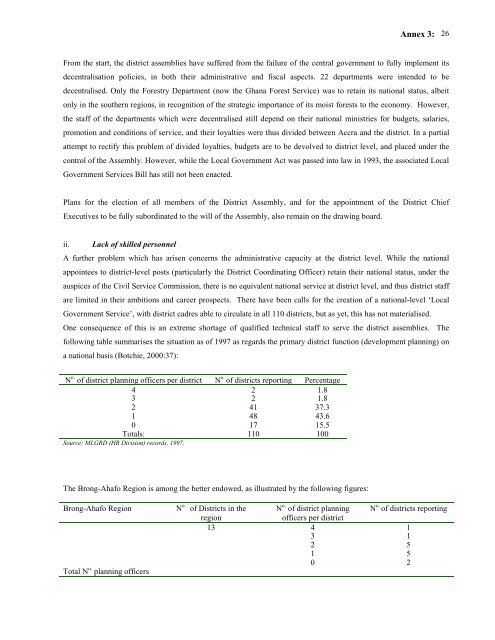Poverty Dimensions of Public Governance and Forest Management ...
Poverty Dimensions of Public Governance and Forest Management ...
Poverty Dimensions of Public Governance and Forest Management ...
Create successful ePaper yourself
Turn your PDF publications into a flip-book with our unique Google optimized e-Paper software.
Annex 3: 26<br />
From the start, the district assemblies have suffered from the failure <strong>of</strong> the central government to fully implement its<br />
decentralisation policies, in both their administrative <strong>and</strong> fiscal aspects. 22 departments were intended to be<br />
decentralised. Only the <strong>Forest</strong>ry Department (now the Ghana <strong>Forest</strong> Service) was to retain its national status, albeit<br />
only in the southern regions, in recognition <strong>of</strong> the strategic importance <strong>of</strong> its moist forests to the economy. However,<br />
the staff <strong>of</strong> the departments which were decentralised still depend on their national ministries for budgets, salaries,<br />
promotion <strong>and</strong> conditions <strong>of</strong> service, <strong>and</strong> their loyalties were thus divided between Accra <strong>and</strong> the district. In a partial<br />
attempt to rectify this problem <strong>of</strong> divided loyalties, budgets are to be devolved to district level, <strong>and</strong> placed under the<br />
control <strong>of</strong> the Assembly. However, while the Local Government Act was passed into law in 1993, the associated Local<br />
Government Services Bill has still not been enacted.<br />
Plans for the election <strong>of</strong> all members <strong>of</strong> the District Assembly, <strong>and</strong> for the appointment <strong>of</strong> the District Chief<br />
Executives to be fully subordinated to the will <strong>of</strong> the Assembly, also remain on the drawing board.<br />
ii. Lack <strong>of</strong> skilled personnel<br />
A further problem which has arisen concerns the administrative capacity at the district level. While the national<br />
appointees to district-level posts (particularly the District Coordinating Officer) retain their national status, under the<br />
auspices <strong>of</strong> the Civil Service Commission, there is no equivalent national service at district level, <strong>and</strong> thus district staff<br />
are limited in their ambitions <strong>and</strong> career prospects. There have been calls for the creation <strong>of</strong> a national-level ‘Local<br />
Government Service’, with district cadres able to circulate in all 110 districts, but as yet, this has not materialised.<br />
One consequence <strong>of</strong> this is an extreme shortage <strong>of</strong> qualified technical staff to serve the district assemblies. The<br />
following table summarises the situation as <strong>of</strong> 1997 as regards the primary district function (development planning) on<br />
a national basis (Botchie, 2000:37):<br />
N o. <strong>of</strong> district planning <strong>of</strong>ficers per district N o. <strong>of</strong> districts reporting Percentage<br />
4 2 1.8<br />
3 2 1.8<br />
2 41 37.3<br />
1 48 43.6<br />
0 17 15.5<br />
Totals: 110 100<br />
Source: MLGRD (HR Division) records, 1997.<br />
The Brong-Ahafo Region is among the better endowed, as illustrated by the following figures:<br />
Brong-Ahafo Region N o. <strong>of</strong> Districts in the N o. <strong>of</strong> district planning N o. <strong>of</strong> districts reporting<br />
region<br />
<strong>of</strong>ficers per district<br />
13 4 1<br />
3 1<br />
2 5<br />
1 5<br />
0 2<br />
Total N o. planning <strong>of</strong>ficers
















